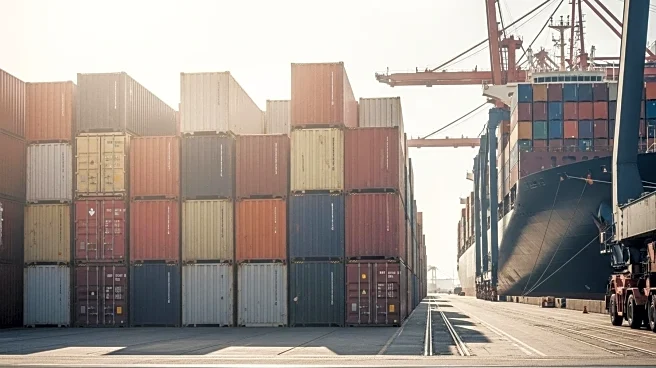What is the story about?
What's Happening?
Consultancy Project44 has reported a significant increase in blank sailings on U.S.-China trade routes, attributed to the 'Liberation Day' tariff rollout. Blank sailings, which are cancellations of scheduled shipping voyages, have surged to levels comparable to the early months of the COVID-19 pandemic. This increase is concentrated on trade lanes most affected by tariffs, with China-to-U.S. routes alone seeing 67 planned blank sailings. Year-over-year, China-USWC blanks have risen by 46%, and SE Asia-USWC blanks by 41%. The consultancy notes that these cancellations are a response to weaker U.S. import demand and the uncertainty created by ongoing tariff measures.
Why It's Important?
The rise in blank sailings highlights the impact of tariff pressures on global trade, particularly between the U.S. and China. This development affects manufacturers, importers, and end users, as the cost of tariffs is distributed among these stakeholders. The cancellations indicate a strategic move by carriers to maintain rate stability in a market distorted by tariffs. The reduction in export volume from the U.S. to China, down 40% year-over-year, further underscores the challenges faced by U.S. exporters. This situation could lead to long-term shifts in sourcing and trade patterns, affecting economic stakeholders on both sides of the Pacific.
What's Next?
Carriers are likely to continue adjusting their strategies to manage the tariff-induced market conditions. This may involve further blank sailings to support rate stability and match U.S. export services with demand. The ongoing tariff measures could prompt businesses to explore alternative sourcing options, although such shifts may take years to materialize fully. Stakeholders will need to monitor the situation closely to adapt to the evolving trade landscape.
Beyond the Headlines
The increase in blank sailings may have broader implications for global supply chain dynamics. As carriers adjust to tariff pressures, there could be a ripple effect on shipping rates and logistics strategies worldwide. Additionally, the situation raises questions about the long-term viability of current trade policies and their impact on international relations and economic stability.


















